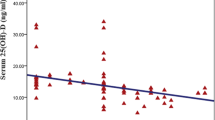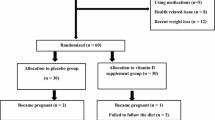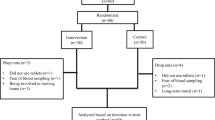Abstract
Background
In this study, we investigated the effect of calcium and vitamin D (Ca/Vit D) supplementation on the clinical, hormonal, and metabolic profile of patients with low vitamin D levels. In addition, we investigated the effect of Ca/Vit D supplementation on asymmetric dimethylarginine (ADMA) level in patients with polycystic ovary syndrome (PCOS).
Methods
In total, 75 patients aged 19–35 years, with a normal body mass index and a diagnosis of PCOS and Vit D deficiency/insufficiency, were included in the study. Patients received 50,000 IU of vitamin D3 once a week for 8 weeks. Afterward, 2500 mg calcium carbonate equivalent to 1000 mg calcium ion and 9.68 mg cholecalciferol equivalent to 880 IU vitamin D3 were administered orally as a maintenance treatment once a day.
Results
The mean age of the patients was 21.7 ± 3.5. After Ca/Vit D supplementation, Vit D levels significantly increased compared to baseline (8.6 ng/ml) levels. An increase in SHBG levels (p < 0.001), a decrease in total testosterone, FAI (p = 0.042), and ADMA levels (p < 0.001) were observed in the first and third months compared to the onset. Significant improvement compared to baseline was observed in menstrual irregularity and median mFG score.
Conclusion
Ca/Vit D supplementation can improve PCOS symptoms such as menstrual dysfunction, hirsutism, and hyperandrogenism. It may be effective in reducing the risk of cardiovascular disease in patients with PCOS later in life by decreasing ADMA levels, which is an indicator of endothelial dysfunction.
Similar content being viewed by others
References
Escobar-Morreale HF (2018) Polycystic ovary syndrome: definition, aetiology, diagnosis and treatment. Nat Rev Endocrinol 14(5):270–284
Parikh G, Varadinova M, Suwandhi P et al (2010) Vitamin D regulates steroidogenesis and insulin-like growth factor Binding Protein-1 (IGFBP-1) Production in Human Ovarian Cells. Horm Metab Res 42(10):754–757
Panidis D, Balaris C, Farmakiotis D et al (2005) Serum parathyroid hormone concentrations are increased in women with polycystic ovary syndrome. Clin Chem 51(9):1691–1697
Wehr E, Trummer O, Giuliani A et al (2011) Vitamin D associated polymorphisms are related to insulin resistance and vitamin D deficiency in polycystic ovary syndrome. Eur J Endocrinol 164(5):741–749
Chan JR, Böger RH, Bode-Böger SM et al (2000) Asymmetric dimethylarginine increases mononuclear cell adhesiveness in hypercholesterolemic humans. Arterioscler Thromb Vasc Biol 20(4):1040–1046
Diamanti-Kandarakis E, Alexandraki K, Protogerou A et al (2005) Metformin administration improves endothelial function in women with polycystic ovary syndrome. Eur J Endocrinol 152(5):749–756
Choi YS, Yang HI, Cho S et al (2012) Serum asymmetric dimethylarginine, apelin, and tumor necrosis factor-α levels in non-obese women with polycystic ovary syndrome. Steroids 77(13):1352–1358
Shojaeian Z, Sadeghi R, Latifnejad RR (2019) Calcium and vitamin D supplementation effects on metabolic factors, menstrual cycles and follicular responses in women with polycystic ocvary syndrome: a systematic review and meta-analysis. Caspian J Intern Med 10(4):359–369
Pergialiotis V, Karampetsou N, Panagopoulos P et al (2017) The effect of vitamin D supplementation on hormonal and glycaemic profile of patients with PCOS: a meta-analysis of randomised trials. Int J Clin Pract 71(6):1–8
Wehr E, Pieber TR, Obermayer-Pietsch B (2011) Effect of vitamin D3 treatment on glucose metabolism and menstrual frequency in PCOS women-a pilot study. J Endocrinol Invest 34(10):757–763
Holick MF, Binkley NC, Bischoff-Ferrari HA et al (2011) Evaluation, treatment, and prevention of vitamin D deficiency: an Endocrine Society clinical practice guideline. J Clin Endocrinol Metab 96:1911–1930
Joham AE, Teede HJ, Cassar S et al (2016) Vitamin D in polycystic ovary syndrome: relationship to obesity and insulin resistance. Mol Nutr Food Res 60(1):110–118
Rashidi H, Toolabi M, Najafian M et al (2016) The relationship of serum 25-dihydroxy vitamin D3 concentrations with metabolic parameters in non-obese women with polycystic ovarian syndrome. Middle East Fertil Soc J 21(4):264–268
Bonakdaran S, Mazloom Khorasani Z, Davachi B et al (2012) The effects of calcitriol on improvement of insulin resistance, ovulation and comparison with metformin therapy in PCOS patients: a randomized placebo- controlled clinical trial. Iran J Reprod Med 10(5):465–472
Colonese F, Laganà AS, Colonese E et al (2015) The pleiotropic effects of vitamin D in gynaecological and obstetric diseases: an overview on a hot topic. Biomed Res Int 2015:986281
Dabrowski FA, Grzechocinska B, Wielgos M (2015) The role of vitamin D in reproductive health–a trojan horse or the golden fleece?. Nutrients 7(6):4139–4153
Ranjzad F, Mahban A, Shemirani AI et al (2011) Influence of gene variants related to calcium homeostasis on biochemical parameters of women with polycystic ovary syndrome. J Assist Reprod Genet 28(3):225–232
Gupta T, Rawat M, Gupta N et al (2017) Study of effect of vitamin D supplementation on the clinical, hormonal and metabolic profile of the PCOS women. J Obstet Gynecol India 67(5):349–355
Tehrani HG, Mostajeran F, Shahsavari S (2014) The effect of calcium and vitamin D supplementation on menstrual cycle, body mass index and hyperandrogenism state of women with poly cystic ovarian syndrome. J Res Med Sci 19(9):875–880
Pal L, Berry A, Coraluzzi L et al (2012) Therapeutic implications of vitamin D and calcium in overweight women with polycystic ovary syndrome. Gynecol Endocrinol 28:965–968
Firouzabadi RD, Aflatoonian A, Modarresi S et al (2012) Therapeutic effects of calcium & vitamin D supplementation in women with PCOS. Complement Ther Clin Pract 18(2):85–88
Ostadmohammadi V, Jamilian M, Bahmani F et al (2019) Vitamin D and probiotic co-supplementation affects mental health, hormonal, inflammatory and oxidative stress parameters in women with polycystic ovary syndrome. J Ovarian Res 12(1):5
DeUgarte CM, Bartolucci AA, Azziz R (2005) Prevalence of insulin resistance in the polycystic ovary syndrome using the homeostasis model assessment. Fertil Steril 83:1454
Asemi Z, Foroozanfard F, Hashemi T et al (2015) Calcium plus vitamin D supplementation affects glucose metabolism and lipid concentrations in overweight and obese vitamin D deficient women with polycystic ovary syndrome. Clin Nutr 34(4):586–592
Xue Y, Xu P, Xue K et al (2017) Effect of vitamin D on biochemical parameters in polycystic ovary syndrome women: a meta-analysis. Arch Gynecol Obstet 295(2):487–496
Charitidou C, Farmakiotis D, Zournatzi V et al (2008) The administration of estrogens, combined with antiandrogens, has beneficial effects on the hormonal features and asymmetric dimethyl-arginine levels, in women with the polycystic ovary syndrome. Atherosclerosis 196(2):958–965
Heutling D, Schulz H, Nickel I et al (2008) Asymmetrical dimethylarginine, inflammatory and metabolic parameters in women with polycystic ovary syndrome before and after metformin treatment. J Clin Endocrinol Metab 93(1):82–90
Demirel F, Bideci A, Cinaz P et al (2007) Serum leptin, oxidized low-density lipoprotein and plasma asymmetric dimethylarginine levels and their relationship with dyslipidemia in adolescent girls with polycystic ovary syndrome. Clin Endocrinol (Oxf) 67(1):129–134
Acknowledgements
The authors thank all the participants in this study.
Author information
Authors and Affiliations
Contributions
ZSS: protocol/project development, data collection and management, data analysis, and manuscript writing. YSA: data collection and management, data analysis and manuscript writing. SÖ: data collection and management. ÜA: data collection and management. AS, ÇÇ: protocol/project development, data analysis, and manuscript writing.
Corresponding author
Ethics declarations
Ethics approval
This study protocol was approved by the Clinical Research Ethical Committee of Selçuk University Faculty of Medicine with a protocol number of 2015/6 and conducted in accordance with the Declaration of Helsinki and Good Clinical Practices.
Consent to participate
Not applicable.
Consent for publication
All authors have read and approved the final version of this manuscript and have consented for publication.
Conflicts of interest
No conflict of interest was declared by the authors.
Additional information
Publisher's Note
Springer Nature remains neutral with regard to jurisdictional claims in published maps and institutional affiliations.
Rights and permissions
About this article
Cite this article
Sert, Z.S., Yılmaz, S.A., Seçilmiş, Ö. et al. Effect of calcium and vitamin D supplementation on the clinical, hormonal, and metabolic profile in non-obese women with polycystic ovary syndrome. Ir J Med Sci 191, 2657–2662 (2022). https://doi.org/10.1007/s11845-021-02899-3
Received:
Accepted:
Published:
Issue Date:
DOI: https://doi.org/10.1007/s11845-021-02899-3




